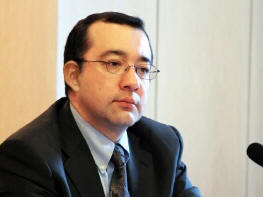IMF official says Moldova overcame the crisis
Chisinau, 21 October /MOLDPRES/ - Moldova has got out of the
2010 economic crisis after one year of severe economic
recession, according to data made public by the International
Monetary Fund (IMF). At a today's news conference, IMF Resident
Representative in Chisinau Tokhir Mirzoev said that Moldova may
improve its economic situation by increasing exports and
continuing structural reforms. Asked to explain how the crisis that started in the United
States hit so seriously a country with few financial ties with
the West, Tokhir Mirzoev said that "the economies of such
countries as Moldova and Ukraine had a too weak immunity to cope
with the crisis." Besides, before the crisis, Moldova consumed
more than it gathered, and made no reserves," Mirzoev added.
With the National Statistics Bureau (BNS) reporting a
5.6-per-cent economic growth in the first half of 2010, the IMF
said Moldova will record a 3.2-per cent increase in the Gross
Domestic Product (GDP) in 2010 and 3.5 per cent in 2011.
Although it was a year of relative political instability, in
2010, the domestic demand registered a 4.9-per-cent increase
against a diminution of 17.1 per cent in 2009. The regional
average of the domestic demand grew by four per cent in Eastern
Europe.
The head of the Chisinau-based IMF office held a news conference
after the Fund had made public a report on prospects for the
development of the regional economy in Europe. The IMF explained
the harshness of the economic crisis in Eastern Europe by the
quick increase in domestic consumption due to effervescence of
credits which unbalanced the budgets by overheating economies
and economic vulnerability.
To support the convalescent economies, the IMF recommended
consolidating the national budgets and starting new
"locomotives" of growth. For Moldova, these should be exports
and structural reforms: improving the business environment and
optimizing the public sector.
Asked to explain how the crisis that started in the United
States hit so seriously a country with few financial ties with
the West, Tokhir Mirzoev said that "the economies of such
countries as Moldova and Ukraine had a too weak immunity to cope
with the crisis." Besides, before the crisis, Moldova consumed
more than it gathered, and made no reserves," Mirzoev added.
With the National Statistics Bureau (BNS) reporting a
5.6-per-cent economic growth in the first half of 2010, the IMF
said Moldova will record a 3.2-per cent increase in the Gross
Domestic Product (GDP) in 2010 and 3.5 per cent in 2011.
Although it was a year of relative political instability, in
2010, the domestic demand registered a 4.9-per-cent increase
against a diminution of 17.1 per cent in 2009. The regional
average of the domestic demand grew by four per cent in Eastern
Europe.
The head of the Chisinau-based IMF office held a news conference
after the Fund had made public a report on prospects for the
development of the regional economy in Europe. The IMF explained
the harshness of the economic crisis in Eastern Europe by the
quick increase in domestic consumption due to effervescence of
credits which unbalanced the budgets by overheating economies
and economic vulnerability.
To support the convalescent economies, the IMF recommended
consolidating the national budgets and starting new
"locomotives" of growth. For Moldova, these should be exports
and structural reforms: improving the business environment and
optimizing the public sector.
|